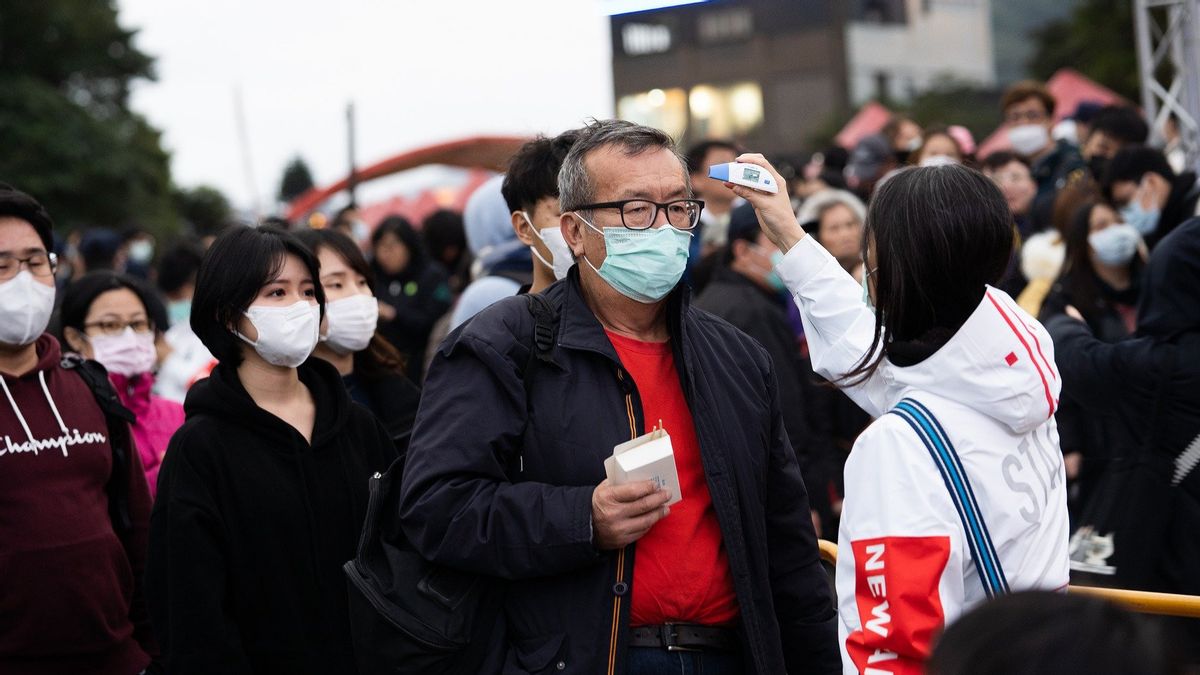JAKARTA - Since the beginning of 2020, the world has begun to realize the dangers of the corona virus pandemic (SARS-CoV-2) or better known as COVID-19. Not many countries have managed to anticipate this disease virus that attacks the respiratory and immune systems.
It didn't take long, since the virus was identified by the World Health Organization (WHO). The corona virus has quickly infected a number of people, including outside the city of Wuhan, China.
China's closest relative, Taiwan is also affected by COVID-19. However, unlike most countries, Taiwan has managed to tightly control the transmission and spread of the corona virus in the ten weeks since this pandemic began to spread globally.
The number of positive patients infected with COVID-19 in Taiwan has been completely suppressed, so as not to exceed 400 cases. Why this happens, the answer is a lesson from the past when Taiwan faced the SARS outbreak in 2003.
During the SARS outbreak, Taiwan was one of the worst affected regions, as was Hong Kong and Southern China. More than 150,000 people were quarantined in Taiwan and 181 people died.
Indeed, the SARS disease outbreak cannot be compared to the current COVID-19 pandemic. However, SARS provided a brief, shadowy, to most countries in Asia about the readiness of the government to respond to future disease outbreaks.
This is helping many countries in the region react more quickly to the current COVID-19 outbreak and take decisions more seriously than in other parts of the world, both at the government and community levels. Areas in areas like Taiwan have the courage to control borders and the massive wearing of masks is fast becoming a thing.
As summarized from CNN, Taiwan has a world-class health system, with universal coverage. When news of COVID-19 began to emerge from Wuhan during Chinese New Year, officials at Taiwan's National Health Command Center (NHCC) moved quickly to respond to the potential threat.
"Taiwan rapidly produced and implemented at least 124 action items in the last five weeks to protect public health," said Jason Wang, a doctor in Taiwan and professor at Stanford Medicine.
"Policies and actions go beyond border control because they recognize that it is not enough." he added.
Taiwan has started to control borders as other countries are still debating what to do. In a study carried out in January, Johns Hopkins University said Taiwan was one of the most at risk areas outside mainland China because of its proximity, ties and transport links to China.
Among the decisive initial steps were decisions to ban travel to and from mainland China, bar cruise ships from mainland China from docking, and impose strict laws against anyone violating home quarantine orders.
In addition, Taiwanese authorities are also moving to increase domestic production of masks to ensure safe supplies, launch testing and impose penalties for spreading disinformation related to COVID-19.
"Given the continuing spread of COVID-19 around the world, understanding the measures being implemented quickly in Taiwan, and the effectiveness of these measures in preventing large-scale epidemics, can serve as lessons for other countries," said Wang and colleagues.
"The Taiwanese government learned from the SARS experience in 2003 and established a public health response mechanism for rapid action for the next crisis. Well-trained and experienced authorities quickly recognized the crisis and activated emergency management structures to cope with emerging outbreaks," added Wang.
Sadly, there are reports from of an increase in domestic violence since the # COVID19 outbreak began. We call on countries to include services to #EndViolence as an essential service that must continue during the response. There is never any excuse for violence. pic.twitter.com/Z4MQN0JwRf
- Tedros Adhanom Ghebreyesus (@DrTedros) April 4, 2020
The swift and transparent response from Taiwanese authorities is an example of how democracy can control the epidemic, even as the world claims only China is effectively controlling the virus. Taiwan also strongly avoids decisions like lockdown, the way China and many countries in the world to suppress the spread of COVID-19.
Taiwan is in a strong position now, after weeks of banning the export of masks to ensure domestic supplies are safe. Taiwanese authorities said they would donate 10 million masks to the United States, Italy, Spain and nine other European countries. as well as small countries that have diplomatic relations with Taiwan.
Clash of Political Issues
The news of Taiwan's success in preventing the COVID-19 outbreak is widening, covered by worsening COVID-19 cases in Europe and the US. Therefore, it is quite late to learn from Taiwan now.
Many countries did not follow in Taiwan's footsteps in January and February, or to be precise when they still had more opportunities. One potential contributing factor that many observers say is that Taiwan is not a member of the World Health Organization (WHO).
Taiwan is claimed by China as part of its territory and Chinese authorities prevent Taiwan from participating in many international organizations unless it is done in the name of 'one China', such as calling themselves 'Chinese Taipei'.
Wow, can't even utter "Taiwan" in the WHO? You should set politics aside in dealing with a pandemic. FYI @WHO, 450+ news reports from 40+ countries so far positively covered # Taiwan's handling of # COVID19. These reports do not mistake us as part of China & #TaiwanCanHelp. JW https://t.co/KbupbUb7NG
- 外交部 Ministry of Foreign Affairs, ROC (Taiwan) 🇹🇼 (@MOFA_Taiwan) March 29, 2020
Lack of information may force Taiwan to make decisions on its own and as early as possible independently of WHO guidance and broader international consensus. Taiwanese authorities have repeatedly complained that their exclusion from the WHO is preventing Taiwan from playing a full role in the global response.
"We want to help, send our great doctors, our great researchers, our great nurses, and to share our knowledge and experience with the countries that need it," said Chen Chien-jen, an epidemiologist at Johns Hopkins.
"We want to be a good global community and make a contribution, but at the moment we can't afford it," he said.
The English, Chinese, Japanese, Arabic, and French versions are automatically generated by the AI. So there may still be inaccuracies in translating, please always see Indonesian as our main language. (system supported by DigitalSiber.id)













